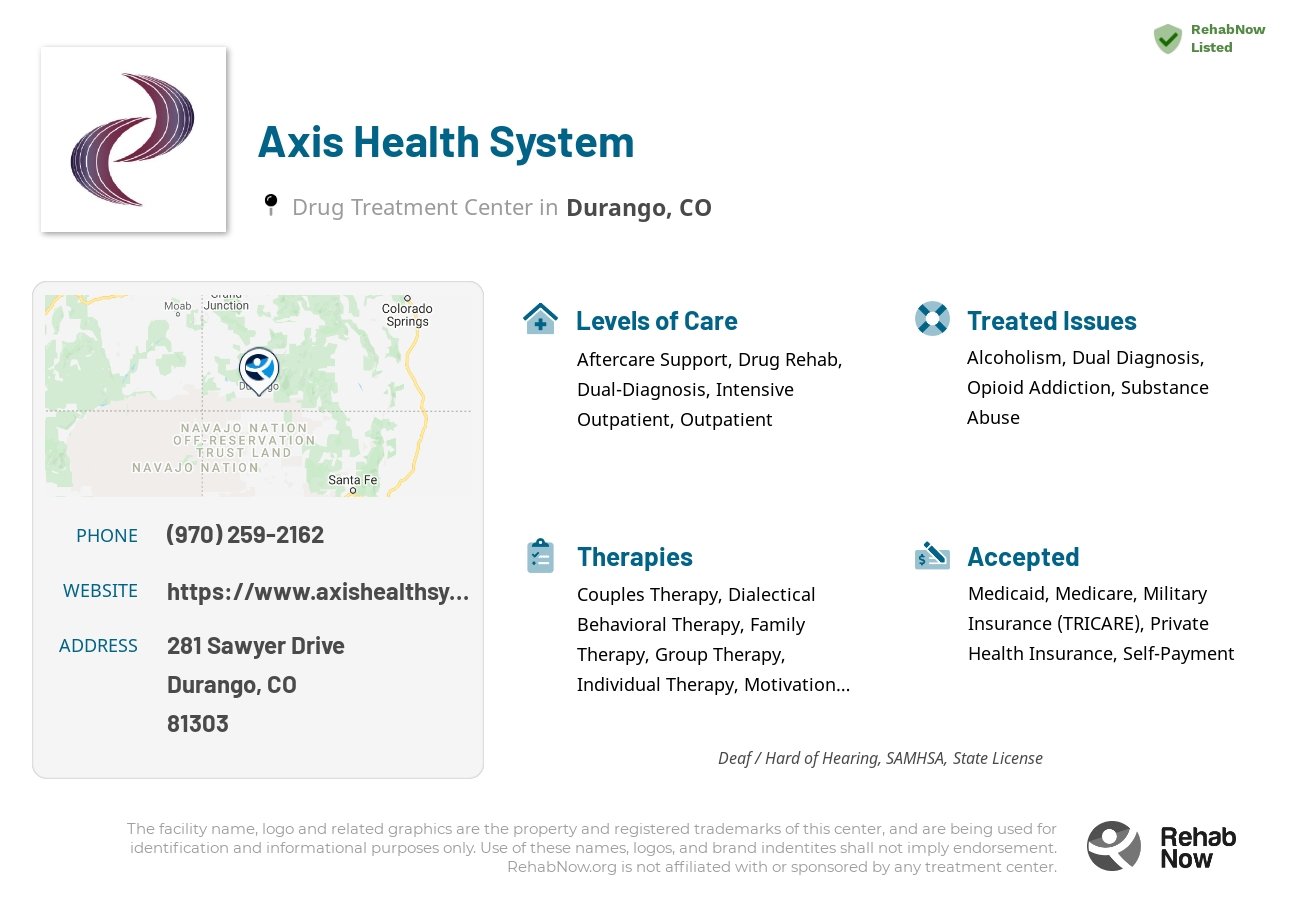Axis Health System
Drug Rehab Center in Durango, Colorado
Axis Health System provides comprehensive and individualized addiction treatment services, including outpatient and inpatient care, medication-assisted treatment, counseling services, and education, to help patients successfully recover and achieve a healthier lifestyle with the help of a team of certified professionals.
About Axis Health System in Colorado
Axis Health System is a renowned Addiction Treatment Facility located in Durango, Colorado. With a long-standing history since its establishment in 1960, Axis Health System has been dedicated to helping individuals suffering from Alcoholism, Dual Diagnosis, Opioid Addiction, Substance Abuse, and Drug Addiction. As an accredited facility recognized by the Substance Abuse and Mental Health Services Administration (SAMHSA) and holding a State License, Axis Health System provides a comprehensive range of services to address the specific needs of their patients. The facility offers Aftercare Support, Drug Rehab, Dual-Diagnosis treatment, as well as Intensive Outpatient and Outpatient levels of care. Individuals seeking treatment at Axis Health System can find solace in knowing they are receiving care from a reputable and trusted institution.
At Axis Health System, their main focus is to provide effective and personalized services for addiction and substance abuse. The facility offers a variety of treatment options catering to the different needs and circumstances of their patients. Through their Drug Rehab programs, individuals can receive intensive treatment and support to overcome their dependencies in a structured environment. Axis Health System also specializes in Dual-Diagnosis treatment, acknowledging the importance of addressing mental health issues alongside substance abuse. Additionally, they provide Intensive Outpatient and Outpatient levels of care for individuals who require a less intensive approach to treatment, allowing them to balance their recovery with their daily responsibilities. With a strong emphasis on aftercare support, Axis Health System ensures that their patients receive the necessary resources and guidance to maintain their sobriety and successfully transition back into society.
Genders
Ages
Modality
Additional
Accreditations
State License
SAMHSA
Conditions and Issues Treated
A combination of treatments is often needed to treat drug abuse. Some addictions can be treated with counseling and support groups. In other cases, drug abuse can lead to a medical problem and require medical treatment. Treatment for drug addiction typically combines counseling and psychotherapy with medication and behavioral therapies.
A combination of treatments is often needed to treat drug abuse issues effectively. In the case of drug abuse, there is no easy answer or one-size-fits-all cure.
Opioid addiction has become a significant health problem in the United States. In 2015, there were 91 opioid overdose-related deaths per day, with a substantial increase in mortality rate in 2014.
When opioid addiction has reached a point where a person’s life becomes unmanageable, treatment options are available to help them get sober. Treatment that includes medical care with medications and counseling can help a user transition into sobriety.
When someone in struggles with both addiction and mental or emotional illness, this is considered a dual diagnosis. Dual diagnosis treatment can include therapy for these issues to happen simultaneously, which will allow either of them to be treated effectively.
Sometimes people who have suffered from addiction disorder also suffer from co-occurring disorders such as depression, anxiety, bipolar disorder, etc., making them “dual diagnoses.” Dual diagnoses require specialized treatment programs where drug and alcohol addiction are addressed along with psychiatric illnesses. Some rehabilitation facilities provide patients suffering from cooccurrences a program with highly integrated services and a clean environment with few distractions to help them succeed.
Levels of Care Offered
This center offers a variety of custom treatment tailored to individual recovery. Currently available are Aftercare Support, Drug Rehab, Dual-Diagnosis, Intensive Outpatient, Outpatient, with additional therapies available as listed below.
The Intensive Outpatient Program offered by Axis Health System is designed for those who need intensive care but would rather get it in the comfort of their own home. The treatment programs vary in duration and intensity and can be tailored to suit the patient’s needs. The program includes regular visits to the facility, though the overnight stay is not needed. IOP is suitable for patients who have been treated in residential treatment programs and are in the transition phase. It helps the patient live at home and discharge some work or school responsibilities even while undergoing treatment. The patients gradually get back to their routine life with the support of a friend or family member.
Outpatient treatment is often used for drug addicts in drug rehab. Outpatient treatment consists of counseling and therapy sessions. This form of treatment is also called ‘day-treatment’. The outpatient treatment process begins with the addict’s initial detox period, lasting about ten days.
Outpatient treatment is used for those who are at moderate risk for ‘slipping back’ into the addiction, for those who:
- Are not currently experiencing any side effects from withdrawal and can handle social pressure
- Can handle stressors that might trigger relapse
- Have a stable living environment or have moved out of their previous environment, which was not conducive to being sober
- Have a support system that allows them to go to a facility a few times a week while still keeping their current responsibilities
- Have no legal obligations, being either on parole or probation, that require them to seek treatment at a mandatory facility
- Are not currently experiencing any side effects from withdrawal and can handle social pressure
- Have a stable living environment or have moved out of their previous environment, which was not conducive to being sober
Completing a drug or alcohol rehab program is only the first step. Then comes aftercare support. These services include sober living accommodations, career counseling, and AA/NA programs for those struggling with sobriety or who want help maintaining it after initial rehab at an addiction facility.
They can last up to a year or more depending on what’s needed most urgently after the earlier stages are completed.
Therapies & Programs
Because no single treatment is effective for all addicts, the goal of treatment and therapy should be to figure out what works best for each individual. Tolerance and withdrawal levels differ from person to person, affecting the treatment intensity required. Addiction treatment should aim to help addicts develop healthy coping mechanisms for dealing with their addiction and its underlying causes.
Couples therapy works with clients and significant others in a professional capacity to improve relationship dynamics. This can be helpful for addicts who are trying to marry the idea of recovery into their work, family, social lives – any aspect that has to do with relationships. Through counseling sessions, addicts will have an opportunity to talk about their addiction with professional partners.
Family therapy is beneficial for people who are in addiction treatment services because it offers addicts the opportunity to work with their family members to better understand what led them to make choices that contributed to their addiction.
This type of therapy helps family members reach a deeper understanding of how they can best support their loved one during recovery. It also helps the addict better understand their own motivations and triggers that led them to turn to substance abuse.
Family therapy can help addicts in the following ways:
- Assists family members in processing difficult feelings so they don’t blame or resent recovering addicts
- Assists family members in understanding how addiction has impacted the addict and everyone who is involved with them
- Allows the addict to take responsibility for their actions, while encouraging improved communication skills
- Helps family members understand how to best support an individual in recovery so addicts don’t relapse again.
Group therapy can help build a stronger support system and give addicts in Durango, CO insight into their addiction that they gain through shared conversations. Group therapy occurs in a controlled group environment, exclusive of one on one meetings. This makes it safer for patients to feel comfortable sharing the struggles they’re going through and gaining perspective.
Trauma therapy is beneficial for people who are recovering from drug addiction because it helps them heal from past traumas that may have caused them to turn to harmful substances or led them to experience negative emotions that contributed to their destructive behaviors.
This type of treatment works by processing difficult experiences so individuals can learn how to process these events without having to turn to substances for coping.
Trauma therapy can help addicts in the following ways:
- Helps individuals understand their experiences and emotional responses to difficult events, including why they turned to drugs or alcohol
- Provides them with comfort and support while working through difficult emotions related to these traumatic experiences
- Offers an opportunity for addicts to have a voice and be heard, which can improve their self-esteem
- Can help them develop coping skills so they can better respond to triggers instead of turning to substance abuse.
Dialectical Behavior Therapy (DBT) is a cognitive-behavioral therapy that helps patients understand the relationship between their thoughts, feelings, and behaviors. It is beneficial for those whose addictions and behaviors stem from severe mental health issues. The term “Dialectic” means the integration of opposites. In substance abuse, DBT refers to accepting the patient’s addiction and working to change their thoughts and behavior. It improves life skills such as controlling intense emotions without reacting impulsively, resolving interpersonal conflicts effectively, and promoting awareness about self and others.
Cognitive-behavioral therapy is a technique that is used to help people with addiction. Specifically, it is a way of identifying thoughts and behaviors that cause the addiction. It is typically used in an individual counseling session.
The content explains cognitive behavioral therapy and how it works to address some behaviors that may be leading to unintended consequences in their life, as well as its benefits for those seeking sobriety.
It works by helping people to talk through their issues and addressing the thoughts that cause said behaviors. It is an excellent way of learning about oneself and one’s perception of the world.
Payment Options Accepted
For specific insurance or payment methods please contact us.
Is your insurance accepted?
Ask an expert, call (888) 674-0062
Axis Health System Associated Centers
Discover treatment facilities under the same provider.
- Axis Health System - Columbine Behavioral Healthcare in Durango, CO
- La Plata Integrated Healthcare in Durango, CO
- Axis Health System - Cortez Integrated Healthcare in Cortez, CO
- Columbine Behavioral Healthcare in Durango, CO
- Crossroads at Grandview in Durango, CO
Learn More About Axis Health System Centers
Additional Details
Specifics, location, and helpful extra information.
Durango, Colorado 81303 Phone Number(970) 259-2162 Meta DetailsUpdated November 25, 2023
Staff Verified
Axis Health System Patient Reviews
There are no reviews yet. Be the first one to write one.
Durango, Colorado Addiction Information
The Centennial State has slipped to a ranking of 12th in the country for drug abuse. Each year around 24% of the state's population uses illegal drugs while nearly 5% of its population abuses alcohol. Substance-related deaths in Colorado were responsible for 15.12% between 2008 and 2017. Fortunately, Colorado drug and alcohol addiction treatment are available to help a person overcome addiction.
In 2013, 1,743 people were living in Durango who was dependent on or abusing drugs. Additionally, in 2013 there were 682 admissions to treatment centers for drug abuse in the Durango area. In Durango, there are 4 addiction treatment centers. A few different drug treatment options are available in Durango, Colorado. The most common type of drug rehab is an inpatient facility.
Treatment in Nearby Cities
- Burlington, CO (336.2 mi.)
- Pagosa Springs, CO (47.8 mi.)
- Manitou Springs, CO (196.4 mi.)
- Alamosa, CO (111.5 mi.)
- Antonito, CO (103.6 mi.)
Centers near Axis Health System
The facility name, logo and brand are the property and registered trademarks of Axis Health System, and are being used for identification and informational purposes only. Use of these names, logos and brands shall not imply endorsement. RehabNow.org is not affiliated with or sponsored by Axis Health System.




